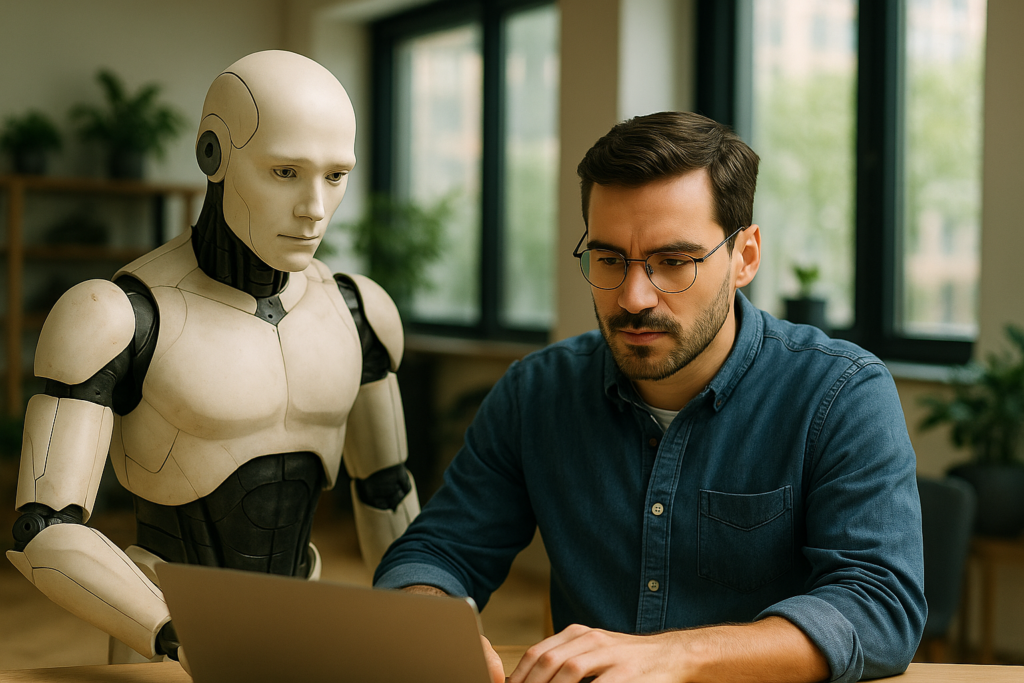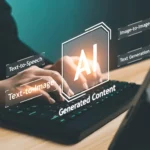
Introduction: The Invisible Companion
You won’t see it when it enters a room.
You won’t hear it knocking on your door.
But it’s already inside your home, your phone, your mind.
Artificial Intelligence doesn’t arrive with fanfare. It comes with a suggestion.
“Here’s a movie you might like.”
“Do you want to finish that sentence?”
“Traffic is heavy—try another route.”
AI doesn’t look like the robots from old sci-fi films. It’s quieter, more thoughtful, and already an integral part of our daily lives. Most people, however, are unaware of this.
From Invention to Integration
Unlike most inventions that enter the world with a clear identity—such as the light bulb or the airplane—AI is shapeless. It can be a chatbot, a voice assistant, a fraud detector, a painter, or even an investment advisor.
It was never just one thing. AI is more like electricity than a gadget—it flows through systems, activating intelligence wherever it’s plugged in.
AI’s power doesn’t lie in one domain. It thrives on connection:
- Data + AI = Predictive medicine
- Language + AI = Real-time translation
- Vision + AI = Autonomous vehicles
- Creativity + AI = Music, art, design
The possibilities aren’t linear—they’re exponential.
The Mind Without a Body
AI doesn’t need sleep, food, or rest. It doesn’t get emotional or forget its purpose. But it learns. Rapidly. Endlessly. Without ego. Without fear.
This new form of intelligence is:
- Always present
- Always processing
- Always evolving
It doesn’t have a body, but it’s more productive than any factory. It doesn’t have a face, but it’s more recognizable than any brand.
And maybe that’s why it feels so strange—a mind without a soul.
But is that entirely true?
The Human-AI Relationship: Not a Rivalry
Some fear that AI will replace humans. But the real picture is more nuanced. AI doesn’t exist to compete—it exists to complete.
Think of AI as your co-pilot:
- It’s helping doctors diagnose diseases earlier.
- It enables people with disabilities to control computers with their eyes.
- It helps farmers use fewer resources to produce a greater quantity of food.
- It’s saving lives by predicting disasters before they happen.
AI isn’t a replacement. It’s amplification.
Where Does It Learn From? Us.
AI is not born wise. It learns from data—and data comes from us—our emails, photos, search history, videos, and voice commands. In essence, we are training our own digital reflection.
But reflections aren’t always flattering. AI can inherit:
- Bias
- Injustice
- Misinformation
So the question becomes:
“If AI is our mirror, what are we showing it?”
Creating responsible AI involves curating ethical data, testing for fairness, and incorporating empathy into the code.
What Makes AI Unique Today
Here’s where AI stands apart from previous technologies:
- It doesn’t just compute. It understands.
- It doesn’t just execute. It decides.
- It doesn’t just repeat. It learns.
This ability to learn from experience is what pushes AI into new territory—territory previously reserved for humans.
From artists to analysts, from students to scientists, AI is not replacing imagination—it’s accelerating inspiration.
The Future: Co-Intelligence
As we move forward, the world will shift from artificial intelligence to co-intelligence—a world where humans and AI think together.
This future looks like:
- Education: Personalized learning based on your pace, style, and interest
- Work: AI teammates help you brainstorm, write, and solve problems
- Cities: AI optimizing energy, transport, and waste management
- Health: AI predicting illness before symptoms even appear
This isn’t tomorrow. It’s already beginning.
Conclusion: A Choice, Not a Destiny
Artificial Intelligence is not a destiny we’re heading toward—it’s a tool we’re shaping. Its future depends not just on programmers or policymakers but on all of us.
We decide:
- What we teach it
- What we use it for
- Where do we draw the line
AI is here. It’s powerful. But it’s also directionless—until we point the way.
In this new age, humanity’s greatest strength may no longer be intelligence—but wisdom.
FAQs
Q1. What exactly is Artificial Intelligence?
A: AI is the simulation of human intelligence in machines. It enables machines to learn from data, recognize patterns, and make decisions—without being explicitly programmed for every scenario.
Q2. Is AI the same as machine learning?
A: Not quite. Artificial Intelligence (AI) encompasses the broader notion of machines exhibiting “intelligence.” Machine learning, on the other hand, is a specific branch of AI that concentrates on algorithms that learn from data to generate predictions or make decisions.
Q3. Will AI take away all jobs?
A: AI will transform jobs, not necessarily eliminate them. Some roles will disappear, new ones will emerge, and many will evolve. Human creativity, empathy, and ethics will continue to be essential.
Q4. Can AI become conscious?
A: No evidence currently suggests AI is conscious or self-aware. It can mimic conversations or emotions, but it doesn’t feel. Consciousness in machines remains a topic of debate and philosophy.
Q5. How does AI impact privacy?
A: AI depends on large datasets, often including personal information. Without proper regulation, this can lead to privacy breaches, surveillance, or the misuse of personal information. Transparent data use and privacy laws are essential.
Q6. Is AI dangerous?
A: Like any powerful tool, AI can be dangerous if misused. Risks include bias, misinformation, and autonomous systems acting unpredictably. The focus must be on ethical and accountable development.
Q7. How can someone start learning AI?
A: Begin your journey with online courses focused on Python, data science, and machine learning. Websites such as Coursera, edX, and Khan Academy provide content that is accessible to beginners. Engaging in real-world projects enhances your comprehension.
Q8. Can AI be creative?
A: Indeed, AI is capable of creating music, art, poetry, and narratives. It relies on patterns and data instead of emotions; however, the outcomes can be remarkable.

